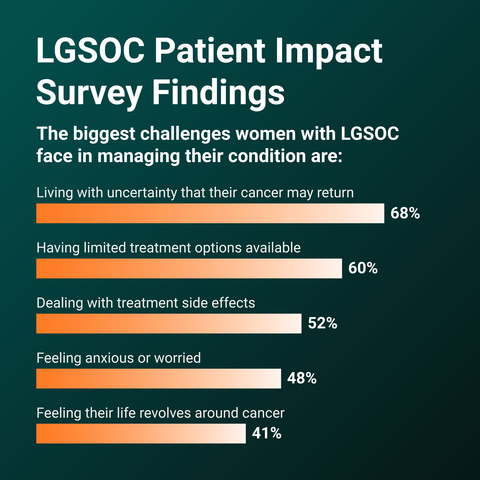Press Release
<< Back
First-Of-Its-Kind, Multi-National Patient Impact Survey Reveals Unique Challenges and Gaps in Care for Patients with Low-Grade Serous Ovarian Cancer
Multiple Years for Diagnosis, Limited Treatment Options, Treatment Side Effects, and Cancer Recurrence Main Concerns of Respondents
Survey Developed Through a Global Collaboration Among Patient Advocacy Groups and Medical Leaders to Uncover and Address the Urgent Needs of Patients
This press release features multimedia. View the full release here: https://www.businesswire.com/news/home/20231107926726/en/

The biggest challenges women with LGSOC face in managing their condition (Graphic: Business Wire)
LGSOC is a rare, highly recurrent ovarian cancer associated with slow but persistent tumor growth and a high mortality rate and is known to be relatively resistant to chemotherapy.2,3,4 In 2014, LGSOC was classified as a separate disease compared to the more common high-grade serous ovarian cancer (HGSOC) by the
“Not only is LGSOC a rare disease, its classification as a distinct type of ovarian cancer was established within the last 10 years. With no medicines specifically approved by the
Delayed Diagnoses and Low Awareness
Results from the survey revealed the challenges people with LGSOC face in obtaining a timely and accurate diagnosis. Among the 81% of participants surveyed
Nearly all those surveyed (99%) had no awareness of LGSOC prior to diagnosis, and 60% did not feel that their HCP was “very knowledgeable” about this rare cancer.1 When it comes to educating about LGSOC, 87% want others to know that symptoms can be easily misdiagnosed as another disease, and 82% feel they should know that it’s important to listen to your body and seek medical attention as soon as possible.1
Challenges with Disease Management, Uncertainty and Anxiety
In the survey, 60% of respondents reported that one of the biggest challenges in managing their disease is that their treatment options are limited, with most (90%) feeling like they are getting the “treatment leftovers” instead of regimens studied in LGSOC.1 More than half (52%) reported experiencing side effects from treatment as a challenge and 25% reported having to pause or stop treatment because they couldn’t tolerate the side effects.1
The data also revealed the impact on respondents of navigating a recurrent disease with limited treatment options. Nearly seven-in-ten (68%) respondents reported that their biggest challenge is living with uncertainty that their cancer will return, more than two-in-five (41%) feel like their lives revolve around their cancer, and nearly half (48%) reported that their biggest challenge is experiencing anxiety or worry.1
“Since my LGSOC diagnosis, it has been so important to have my community around me. Although LGSOC is classified as a rare cancer, we have seen this community come together to provide support for each other, raise awareness of symptoms, and improve outcomes,” said
About the
The sampling precision of Harris online polls is measured by using a Bayesian credible interval. For this study, the sample data is accurate to within ± 7.1 percentage points using a 95% confidence level. This credible interval will be wider among subsets of the surveyed population of interest. All sample surveys and polls, whether or not they use probability sampling, are subject to other multiple sources of error which are most often not possible to quantify or estimate, including, but not limited to coverage error, error associated with nonresponse, error associated with question wording and response options, and post-survey weighting and adjustments.
To view survey details, including methodology, audience demographics, survey data and more, click here. Visit https://letstalkaboutlgsoc.com/resources/patient-impact-survey/ for more information.
*For the purposes of this survey, the term LGSOC refers to people diagnosed with low-grade serous carcinoma of the ovary or peritoneum (the thin layer of tissue lining the abdomen).
**Caution: small sample size (n<100). Results should be interpreted as directional.
About Low-Grade Serous Ovarian Cancer (LGSOC)
Low-grade serous ovarian cancer (LGSOC) is a highly recurrent, chemotherapy-resistant cancer, associated with slow tumor growth and high mortality rate.3 Approximately 6,000 women in the
About Verastem Oncology
Verastem Oncology (Nasdaq: VSTM) is a development-stage biopharmaceutical company committed to the development and commercialization of new medicines to improve the lives of patients diagnosed with cancer. Our pipeline is focused on novel small molecule drugs that inhibit critical signaling pathways in cancer that promote cancer cell survival and tumor growth, including RAF/MEK inhibition and focal adhesion kinase (FAK) inhibition. For more information, please visit www.verastem.com.
1 LGSOC Patient Impact Survey Research Findings. Harris Poll. 2023.
2
3 Grisham, R. Low Grade Serous Carcinoma of the Ovary. Oncology. 2016. 30(7):650-652. https://www.cancernetwork.com/view/low-grade-serous-carcinoma-ovary. Accessed
4 Corrado G, Salutari V, Palluzzi E, Distefano MG, Scambia G, Ferrandina G. Optimizing Treatment in Recurrent Epithelial Ovarian Cancer. Expert Rev Anticancer Ther. 2017; 17:1147-1158. doi: 10.1080/14737140.2017.1398088.
5 Kurman RJ, Carcangiu ML, Herrington CS, Young RH, editors.
6 Ovarian Cancer Guidelines. National Comprehensive Cancer Network. https://www.nccn.org/professionals/physician_gls/pdf/ovarian.pdf. Accessed
7 Slomovitz B, Gourley C,
8 Timar J, Kashofer K. Molecular epidemiology and diagnostics of KRAS mutations in human cancer. Cancer and Metastasis Reviews. 2020;39:1029–1038. https://doi.org/10.1007/s10555-020-09915-5.
9 Baines T. A, Xu D, Der C. J. Inhibition of RAS for cancer treatment: the search continues. Future Medicinal Chemistry. 2011;3(14):1787–1808. https://doi.org/10.4155/fmc.11.121.
View source version on businesswire.com: https://www.businesswire.com/news/home/20231107926726/en/
Media Contact:
Corporate Communications
+1 (781) 292-4205
lbuffington@verastem.com
Source: Verastem Oncology
